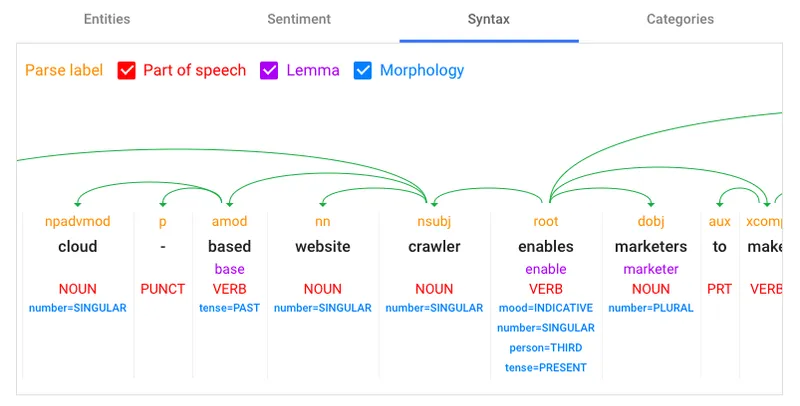
This is a user generated content for MyStory, a YourStory initiative to enable its community to contribute and have their voices heard. The views and writings here reflect that of the author and not of YourStory.

10 Ways Python Can Boost Your Technical SEO
Everyone is talking about artificial intelligence, machine learning, voice search, NLP as the new trend emerging in marketing technology space. Python is the programming language that gained huge popularity recently in the technology industry.

This is a user generated content for MyStory, a YourStory initiative to enable its community to contribute and have their voices heard. The views and writings here reflect that of the author and not of YourStory.

Everyone is talking about artificial intelligence, machine learning, voice search, NLP as the new trend emerging in the marketing technology space.
Python is the programming language that gained huge popularity recently in the technology industry. The SEO community is also loving and accepting the language to automate their work and made life easy.
It’s not required to be a data scientist or any tech geek to understand this programming language. The simple syntax and huge library make it the preferred language to learn and apply to your day-to-day technical SEO.
Organizations encourage their teams to learn the latest MarTech tools and techniques.
Every SEO professional should learn Python to enhance work efficiency and better performance.
From the small to large organization understood the true value of this language and working on it.
What is the Python Programming Language?
Python is an open-source, object-oriented programming language. It supports a wide range of libraries and modules that make it more understandable. The speed and scalability of the Python are unmatchable. Even Google using Python programming language to develop their web-crawlers.
Major functions where Python is used broadly:
- Data computation
- Data extraction
- Data interpretation
- Machine learning
- Natural language processing
- SEO automation
- Deep learning
Why you should use Python for on-page SEO?
Well, SEO is more than link building, black-hat, white-hat SEO methods, meta tag writing now.
Most of the SEO tools are expensive or comes in packages. What if you could implement your own script easily to perform certain activities and tweak it according to your data needs?
Amazing! Right?
Most SEO analysts or marketing professionals are afraid of the programming and coding part of SEO. But, not anymore Python made it simple, it’s easy to learn and implement.
How Python Empowers SEO professionals?
How many of you still performing on-page SEO tasks manually?
A lot of advanced tools already introduced in the market. Tools enhance your productivity, similarly, Python helps SEO automate the tasks which are time-consuming.
Data is the most important asset for an SEO professional. Data analysis is very critical and time taking task. Major functions SEO can perform with the help of Python is analyzing a large chunk of data and find insightful information. Data-driven decision making leads to a successful campaign.
It makes the data more understandable and leverages the marketing campaigns with data.
When you recommend some strategies based on the data in front of your clients, it's more credible and impactful.
Python language used in machine learning, by which you can automate the time-consuming tasks.
SEO task which can be automated by using Python:
#1 SEO analysis of the site for critical issues – SEO analyzer API analyzes the structure of a site, crawls the site, count words in the body of the site and warns of any general SEO related issues. Some major features are:
- Word count
- Page Title
- Meta Description
- Keywords on-page
- Warnings
- Missing title
- Missing description
- Missing image alt-text
#2 Link checker – Did you know even Screaming Frog crawl into a pandas dataframe. It made internal website link analysis, broken link discovery, URL mapping while migrating the site simple and automated.
Crawl404 as the name indicates it helps us find the 404 pages on the site.
#3 Image optimization and find missing ALT tags – DeepCrawl API using Pynthia could make this tedious task easy and less time-consuming. It finds the images on the website and if there is missing tags or caption opportunity available to enhance website SEO.

#4 Keyword ranking computation & recommendation – PyTrends, MatPlotLib are the libraries you can use to automate the keyword ranking positioning. Even Google Trends also use these same libraries to find the audience's interest in particular search terms over time.
#5 Competitive analyses – It’s very difficult to keep your eyes on competitors all the time for their updates and launches. Python makes your repetitive tasks automated like fetch the details of your competitor’s services and products to monitor.
#6 Analytics – You must have been using any analytics tool to track audience behavior and engagement, Google webmaster tool even using Python scripts to track and fetch the data into various formats. You can use these open-source libraries to transfer the data straight into the document files.
#7 Meta tag optimization – XPATHs can be used to extract the meta tags from the client's website and optimize it easily. You can extract, title, description, alt, canonical, H1, robots tags with great ease using Python APIs.
#8 Data analysis & visualization – Requests, Matplotlib, Requests-HTML, Pandas are some of the few libraries that help to analyze and visualize it for better understanding.
#9 Website speed optimization and monitoring – When you have a huge number of webpages on your domain, then how would you test each one of them? It’s a very time-consuming process that can be automated by Python libraries like Selenium, Pandas, BeautifulSoup.
“Using Selenium Webdriver to automate browser actions, we built a script that would grab URLs directly from the sitemap, plug them into Google Pagespeed Insights and collect the mobile time-to-load, along with particular notes given by Pagespeed Insights.” By Derek Hawkins.
#10 Content curation & recommendation – Online streaming sites like Netflix, Amazon Prime all use a certain content recommendation engine. Most of the algorithms developed in Python. Because it has huge APIs and different libraries support the best content curation and recommendation. It understands the meaning of the search string and shows the best possible options.
Some real-world examples are:
Google – Google voice search processing with natural language processing technology. Google search algorithm updates are also inspired by the same technology, in which the queries analyzed and find the most relevant search results and improve the results based on the audience's intent and engagement.

Source: SEJ
Netflix – Netflix shows a recommendation engine use Python-backed machine learning algorithms. Most of the online streaming apps are using the same technology to enhance the capabilities of their content recommendation engine.
Spotify – Spotify song recommendation engine is powered by machine learning.
Twitter – Timeline content is curated based on audience behavior.
Salesforce Einstein – Einstein AI by Salesforce also used Python coded AI-based systems.
How to Start Learning Python for SEO?
I hope you are enough inspired to start learning this amazing language.
Firstly, you should start understanding the basic concept works in Python to leverage your technical SEO efforts. Practicing is the key here, you can’t just learn from reading tutorials, blogs, and articles. Connect with Python professionals and gain basic knowledge and start practicing.
You can start with Codecademy and Kaggle it’s easy, fun and moreover, it’s free.
If you learn by watching videos then here is YouTube playlist - Python For Marketers: Why, What, Expectations | Learn Python for Marketing
You can use the Google Colaboratory platform as its simple Google doc-based program doesn’t require any installation.
Conclusion
Python will enable you to spend more time in finding solutions, rather than just stuck with identifying problems. Let Python handle that part for you. The big organizations already started working on implementing the tools for SEO using Pythion. Python programming community is growing at a great pace and now SEO professionals are also participating in that.
This is the era of automation! Everything should be time-saving, creative, and fast. So, improve your efficiency with Python, and enhance your technical SEO.



